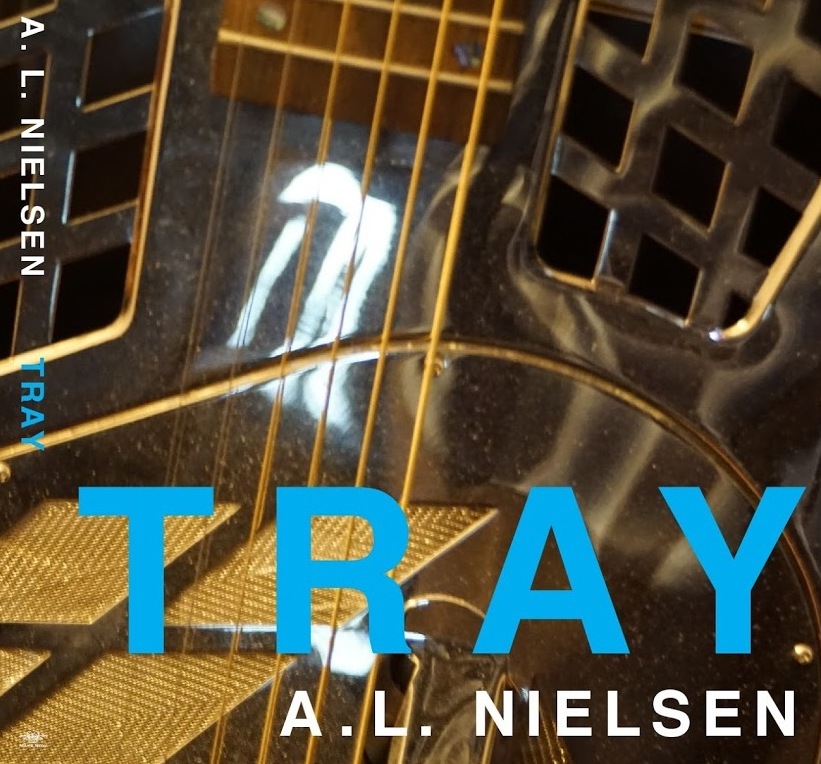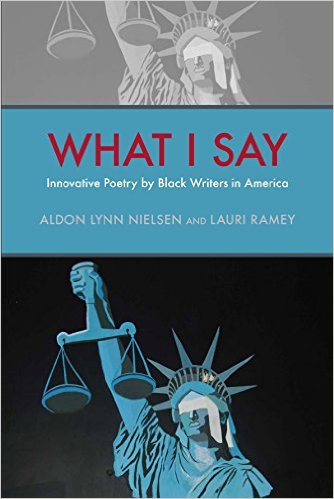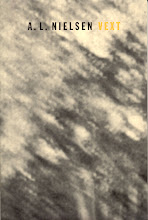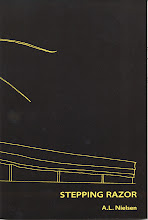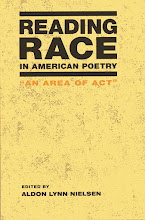I write it small because it's a small beef, and my doctors only allow me beef once a month, but still . . .
In Kevin Young's widely praised collection of essays, The Grey Album: On the Blackness of Blackness, a book that was a Publishers Weekly Top Ten choice in essays and criticism and a finalist for the 2012 National Book Critics Circle Award for Criticism, thus ostensibly somebody's idea of excellence in literary criticism, readers will encounter the following sentences:
"Many critics, such as Aldon Nielsen and Michael North in Reading Race and The Dialect of Modernism, respectively, see Pisa's Pound as merely racist. Racist he may be, but I feel it important to see the ways even a black reader might find something smuggled within the lines worth preserving . . . "
What readers cannot glean from this is that I have always agreed that black readers not only might but would "find something" worthy of preservation in Pound's lines, and that I had made that point long ago. Young cites my first critical volume, Reading Race, but you will note that in a book with copious notes The Grey Album does not in fact cite any pages on which you could find Michael North or me making any such statement, largely because neither of us ever has.
What readers can find in my work are multiple instances of sentences like this one:
"What is often overlooked in these discussions is that there has never been any such thing as a simple racism, a racism that is merely racist."
This particular instance is drawn from an essay I wrote, as it happens, about Ezra Pound. That essay is titled "Ezra Pound and 'The Best Known Colored Man in the United States.'"
And here's the kicker; Kevin Young knows this. My essay appeared in the 2001 volume Ezra Pound and African American Modernism, and appeared earlier in a special issue of the journal Paideuma. Not only does Young also have an essay in that volume, but he cites the volume in his notes to the essay in which his comment about my work appears.
Again, not a large beef -- It is all too often the case that critics early in their careers, in their zeal to establish their own novelty and to set their arguments apart from their predecessors, overstate their claims to be saying something new, often inaccurately disparaging the work that has gone before. It's a sin of scholarship about which I caution younger colleagues whose manuscripts I review, a lesson I learned in the process of editing my own earliest essays. But Young is not new to scholarship, and he is not new to the profession. He knows better. He knows that his comments will be read by many who will not have read the texts he characterizes, and that those readers will come away with an incorrect sense of what earlier critics have had to say on these vital topics.
Kevin Young is a great guy and an important writer. This is clearly a venial sin, one of carelessness. He means well. But, as Sterling Brown used to say, "He means so well, but he does so poorly."
Friday, August 23, 2013
Tuesday, August 13, 2013
NEW POETRY MACHINES - TECH REPORT
The Microsoft Surface Pro as seen by the Ipad Mini.
For many years I have, like many poets, opted for different sizes and textures of paper, different writing instruments, different sorts of notebooks, because the physical field in which I do my writing has always influenced the form of the writing. (Early on, I favored legal pads, writing in more sprawling stanzas than I have in later years.) Making the shift to computers around 1980, I found the same phenomenon at work. Different operating systems, screens and keyboards seemed, sometimes almost subconsciously, to affect the composition.
That imperative met its other, to borrow an academic cliche, at the nexus of art and employment as I searched for the ideal travelling device for my work life. I was an early adopter of the Sony reader and one of the first to use a Kindle. The Kindle DX and Amazon's evolving apps took their place in my daily rounds, but those early machines really were just for reading and email. They made my presentations vastly more convenient, and they were a book-lover's delight, but they were limited. My real dream was a tablet that was a full computer. Microsoft made what I consider a good start in that direction with the Surface Pro, here depicted as photographed by my ipad mini. Once you get past the Windows 8 weirdness curve, this is a pretty great machine. It has finally allowed me to dispense with carrying a laptop on my travels all together. Any program you can run on a desktop or laptop, I can run on the Surface Pro, and the thing is fast. As a computer, it's by far the best thing I've worked with. Still, as a tablet it has its drawbacks. The screen is unbelievably sharp and eye-catching, but the thing is heavy. Not as heavy as my laptops, but with something like Apple's Mac Air on the scene, this will weigh down the sales. The Surface RT, Microsoft's entry in the tablet wars, has not sold all that well, and it's not hard to see why. Despite the stunning clarity of the screen, most would probably opt for the more familiar Ipad products. Other companies are marketing hybrids, computers with touch screens that can be detached from their keyboards. The industry is fumbling for its next direction these days. Whether other people will want and buy what I want remains to be seen. One advantage to something like the Surface Pro is that, since it is running a full version of Windows 8, it can truly multitask, which the major tablets cannot do. When I make conference presentations with my tablets, I need two of them, one to run the power point and the other to serve as my reader.
The Ipad Mini as seen by the Surface Pro.
Meanwhile, back in tablet territory, Amazon again showed the way with the Kindle Fire, and Barnes and Noble's high end Nook was similarly attractive. But Ipad's mini turned out to be the ipad killer. I've been using one of these since they came out. They are incredibly easy to deal with in the field. The screen is pretty good (we still don't know if the next iteration will have the retina screen or not). As I am not a good touch typist, I always prefer a keyboard case to the onscreen keys, and there are several on the market that work well and add precious little to the bulk and weight of the device. The app store is stocked with nearly everything you could ask for. (Though another advantage of the Surface Pro is that it can run full versions of your word processor or presentation software, which the apps available for tablets barely approximate.) Still, as small as the mini is, I can't comfortably hold in in just one hand.
The Google Nexus 7 as seen by itself.
Enter the Google Nexus 7 -- This is the true palm-of-the-hand story. Just to confuse us all, Google has given this the same name as last year's Nexus 7, making ordering accessories unnecessarily problematic, but one look at this screen and you will forgive the gnomes of Google a great deal. As you can see here, the thing fits neatly in one hand, making it an ideal reader, and making it as easy to use in the field as a cell phone. The apps I need for my professional life, such as iannotate PDF, are all there in the Android app store. The new version of the operating system ("Jelly Bean" - what's with these naming conventions anyway?), is easy to learn and nearly as intuitive a UI as what Apple affords. Writing and reading on this thing are both comfortable. Some complain about the lack of a card slot for expanding memory, but I've rapidly gotten over that worry. I got an expansion card for my Surface Pro, but I haven't used it yet. The cloud is all I need for most documents, etc., and the Seagate Wireless Plus I wrote about not long ago in this space streams any music I might want from my extensive collection from my briefcase to this device (or to my phone, for that matter); no SD card could hold my entire collection anyway.
My dream is something like the Nexus 7 able to run all the programs that run on a PC or Mac. Whether enough other people would buy such a thing to make it a viable endeavor for the industry is an open question. For now, I travel with the Surface in my bag and the mini or the Nexus in my hands. Life is so much easier, and the strain on my back so much lighter. [Any of these three will impress with its abilities as a media player. Music sounds as good, if not even better, than on my Archos players. Movies are gorgeous.]
Labels:
Google Nexus 7,
Ipad Mini,
Microsoft Surface Pro
Subscribe to:
Posts (Atom)




